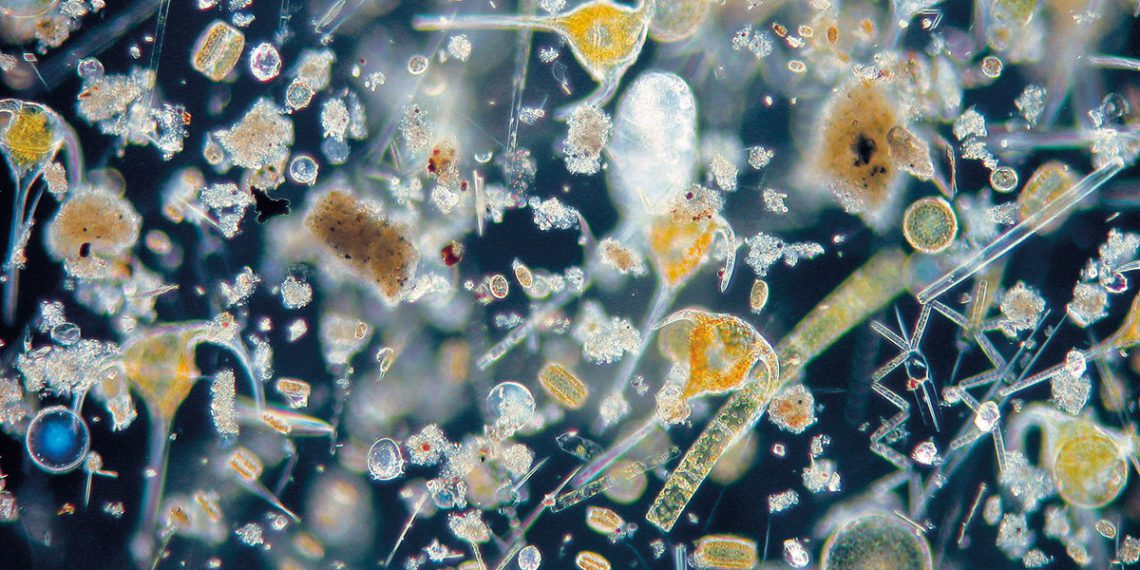Through satellite observations of the light released by microscopic marine plants through natural fluorescence, the Ocean Glow project aims to better understand what controls marine primary productivity. It also aims to improve global monitoring and modeling of their climate-driven changes. For this innovative research idea, Dr. Thomas Browning, marine biologist and chemist at GEOMAR Helmholtz Centre for Ocean Research Kiel, receives one of the coveted Starting Grants of the European Research Council (ERC).
The smallest organisms in the ocean form the basis for all life in the sea: single-celled marine plants, the phytoplankton, produce organic matter. They supply the entire marine food web, on which humans ultimately depend. The immense abundance can even be viewed and mapped from space. But as clearly visible as the proliferation of phytoplankton is, it is still unclear what factors regulate growth and how they are affected by climate change. Dr. Thomas Browning, a marine biologist and chemist at GEOMAR Helmholtz Centre for Ocean Research Kiel (Germany), plans to develop a new approach to determine which nutrients limit phytoplankton growth using satellite observations, with support from a €1.5 million Starting Grant from the European Research Council (ERC).
“Of the models currently used to predict future climate change impacts on phytoplankton productivity, some show increases and others show decreases. As long as this disagreement exists, it is difficult to assess how life-sustaining functions of the ocean, such as food supply or climate regulation, will evolve in the future.” — Dr. Thomas Browning
Results from field research show that ocean productivity is highly dependent on the availability of nutrients, particularly nitrogen and iron. Until now, capturing how nutrient availability limits phytoplankton has required measurements taken on research cruises at sea. This has limited insights to single points in time and very small parts of the ocean. Browning’s Ocean Glow project aims to develop an approach to scale up these observations to global scales using the natural fluorescent light emitted by phytoplankton.
“The fluorescence signals could tell us which nutrients regulate phytoplankton growth. But at present, they are not well enough understood to do so. Ultimately, it may be possible to use satellite observations of fluorescence to conduct global monitoring to observe the effects of climate change and assess the accuracy of climate models,” says Dr. Browning. “Thanks to ERC funding, and building on previous work at GEOMAR, we hope to literally shed new light on crucial questions related to climate change impacts on the ocean.”
The ERC-funded project will run for five years, starting in mid-2022, and includes three new positions for postdoctoral researchers*. At GEOMAR, a novel facility for precisely controlled experiments will be developed to test the fluorescence of four globally relevant phytoplankton species under different nutrient conditions. The measurements from the laboratory will then be compared with data from more complex plankton communities on research expeditions. The final step is to integrate the new information into models and analyze existing satellite data to examine distribution, seasonality and changes in nutrient limitation.
“If we are truly successful in deciphering nutrient limitation from satellite-captured fluorescence, ‘Ocean Glow’ will be successful in three ways,” Dr. Browning points out. “First, the project will help make existing Earth system models more realistic. Second, satellite data from the past 20 years can be reanalyzed to document how climate change has affected ocean productivity to date. And third, we will be able to assess how widespread various nutrient limitations already are in the ocean. This will be key to understanding the future impacts of climate change on the ocean and its various functions for humanity.”
A total of 397 young scientists received ERC Starting Grants totaling 619 million euros in the current funding round. More than 4,000 proposals were received in response to the call for proposals under the European Union’s Horizon Europe research and innovation program, which were reviewed by renowned researchers from around the world. The selected proposals cover all research disciplines, from medical applications of artificial intelligence to designing a legal regime for fair influencer marketing. The projects are being carried out at universities and research centers in 22 European countries, 72 of which are in Germany.

















